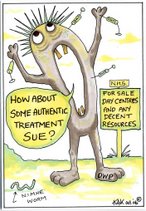
Are these new types of UK wide NHS Trusts : expansively involving with good feedback ?
Good at sharing information ? In control of their own finances ? Democratically engaging ?
No they are not, in anything but mists and paper dreams ..
These new types of Foundation Trusts were supposed to replace the old ones and have new batches of Governors made up of public and service users and staff
The idea was one of more “stakeholder accountability” in the NHS UK – re-linking to the public partly , but the truth is the democracy bone is bare and the arrangements are ritualistic and out of touch with all but a bubbling glass sphere of meetings and lunches ...
The other beneficial claim was the FT's were supposed to plan the use of their own services by what amounted to shaving costs from their own services for “efficiences” and then “ideally” they could divert them to new forms of local beneficial health spends .
Well the Treasury is set to claw back 500 million of those autonomous plans
But equally bad is the emerging truth that as Health-Overview Scrutiny Committee's , appointed by Councils, but who work under statute to check NHS service alterations start to question FT Governors, they can find little that is healthy in the way of quality work and use of influence by Governors
Several concerned sources contacted USERWATCH and have revealed across the country there are few minutes shared or much evidence of FT Governships “working” .. In the north of the country one source close to local government claimed – “there is no evidence at all” .
Another source in the east of the country was asked by UserWatch if they had been in the usual shared information loop of Trust Board Minutes from the local NHS Trusts that had now converted to Foundation Trust status ? After all that had been the historical practice .
The answer was :
“No ! This has all dried up HOSC's don't appear to be in that loop now either – its all gone dry at the information well “
UserWatch checked other sources and sure enough HOSC's with a statutory duty to view services and be abreast of potential changes are not getting Trust Board information of deeper quality from the Foundation Trusts since they became FT's
Naturally you cannot hold anything to account if there is no transparency to see into it, yet the Foundation Trusts were supposed to be better democratically linked - better informing etc to encourage local re-engagement . The truth is, the NHS FT Trusts have slunk back into defensive information management and an iron curtain of information shuffle muffle .
Anyone in the UK or world can try a comparative search method of NHS Trust Board minutes before and after each Trust was granted its FT status by the so called “independent Regulator” MONITOR and what disappears from view is massive amounts of Trust Board information .
This is not wider accountability its an iron fishbowl that only looks transparent by some clever reflective metal tricks
The pattern resembles a kind of equivalent to an anti-information meteor impact too that has caused a large UK wide crater and wiped out the old UK Trust dinosaurs – and no-one is sure that what has evolved is truly linked or useful .
On a parallel note, concern has been expressed in the Lords about the new Health and Social Care monitoring “Local Involvements Networks” - some of which have become cumbersome and bureaucratically crawling . These LINks groups at local levels are not inspiring any but the few and monitoring of the Health and Social Care Services has dropped to an all time low .
The Dept of Health however behaves as if all is rosy in the crater and sips tea with those it tries to convince with its own ideals of brown muddy fudged reality ......
LORDS HANSARD (See Below too)
However, there will probably be some aspects of the Government’s approach that we shall want to examine carefully. There does not seem to be much point in drawing up a set of regulations containing what everyone accepts are already the responsibilities and functions of the NHS and saying that the NHS must have regard to them, unless we see how this will add value to patient care. I need to understand rather better than I currently do what the practical implications of applying, or failing to comply with, the constitution will be for patients and staff and what “having regard to” will really mean.
It is certainly helpful to articulate and assert NHS values. There are those who are apprehensive that, with the private and voluntary sectors playing an increasing part in the provision of NHS care, those values may not always be to the fore and who believe that we need the constitution for that reason if for no other. The trouble is that NHS values, as such, are apparently not to be included in the constitution. Nor are there any proposals to enshrine the principle of independent regulation of healthcare, which is so important if we are to have a genuinely patient-centred service. Rather mysteriously, two of the principles set out in the NHS plan have gone missing, including the principle that the NHS will support and value its staff. I would be interested to hear the Minister’s comment on that.
We are told that one ingredient of the health Bill will be to strengthen public involvement in the commissioning arrangements of primary care trusts. It will be interesting to see what these provisions consist of. I say this with some degree of concern. Noble Lords will remember that, last year, we debated and passed the Local Government and Public Involvement in Health Act, which abolished patients’ forums and made provision for local involvement networks. LINks are meant to be in place and fully functioning across the country by the end of this month. Personally, I would be amazed if that happened. Everything that I and other noble Lords predicted during the passage of the Act has come to pass. There were meant to be transitional arrangements for patient and public involvement following the abolition of forums. Many local authorities have quite simply failed to understand the legislation properly and, in consequence, have failed to put in place those transitional arrangements. Information about the levels of service that host organisations have been contracted to deliver is being withheld, which makes it impossible to assess how well or badly they are doing. Many local authorities appear to believe that once a host is in place they have fulfilled their duties under the law—exactly the misconception that many of us fought so hard to avoid when we persuaded the Government to build transitional provisions into the Bill.
The Government have made public money available to fund such arrangements. Despite that, many local authorities have refused to reimburse volunteers their legitimate expenses. The net result of all this is that many committed and talented people have given up the struggle and are now lost to the system. It is the perception of those who represent LINk members that Ministers are in denial about how bad the situation
11 Dec 2008 : Column 500

.jpg)







2 comments:
"What disappears from view is massive amounts of Trust Board information"
It certainly does when faced with the gentle probing of User Groups.
Following Foundation Trust Watch (Cambridgeshire)'s launch, and several hundred hits from the Trust's servers to our blog - suddenly and mysteriously their website at wwww.cpft.nhs.uk has gone offline (I mean seriously offline, like DNS records erased from the NHS name servers) and the visits from their worker-drones have ceased.
It seems that there's some kind of digital lock down in progress...
But of course information is power and if we're information-less...
Yeah you have it spot on .
Its a lesson they are learning across the country - there are probably internal circulars and stuff circulating amongst Trusts to each other making themselves immune to view and avising each other ..
Its fascinating that while they are trying to become "engaged" they are simultaneously using "engagement" defensively - almost like a police force type tactic on any vision in ..
The DOH is seriously politically motivated and really needs its power buckling - its very intelligence and control driven
.
Post a Comment